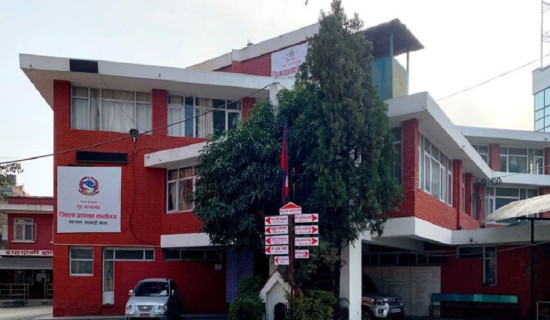- Saturday, 28 February 2026
Deviating From Corruption Agenda Backfires
From hashtags to the frontline, on September 8, the streets of Kathmandu were filled with young voices demanding one thing: END CORRUPTION. The social media ban was a trigger to unleash the public anger against corruption and nepotism. The Gen Z movement that started on social media denouncing #NepoKids quickly swelled into a massive protest. The protests were initially peaceful until the government forces mercilessly killed 19 young students on 8 September. This triggered the angry mob to engage in widespread destruction, including the arson of key government buildings. The death toll has now reached 76. The initial call for accountability evolved into rampant looting and devastation.
Nepal was not the first country to experience a youth-led protest, nor will it be the last. For instance, Sri Lanka, Bangladesh, Georgia, Chile, Kenya, and Indonesia also witnessed powerful demonstrations, some of which led to massive transformations in the governance system. These countries faced deep-rooted corruption, prompting protests that called for accountability and transparency. In Nepal, however, the level of destruction was too catastrophic and unimaginable, which has led to analysts coming up with different theories, including the involvement of foreign powers. Only time will tell what was true and how such devastating destruction was possible within just 24 hours.
Political awareness
The Gen Z movement highlights how young people are becoming more aware of political issues and actively shaping their country's politics. As a result, governments were compelled to enact changes, not for their own benefit but for the people. New forms of protest emerged, empowering young people like never before. People gradually realised that they do not have to accept every decision passively; they can and should raise their voices.
However, we cannot ignore the dark clouds just because the sun has shone a little. The protests have led to violence, instability, weak institutions, delayed reforms, and geopolitical vulnerability. In the context of Nepal, one of the first negative impacts of the protests was a generational divide, separating the population into Gen Z and Non-Gen Z. Age should not be a factor in judging anyone. If a 75-year-old woman had a mindset relevant to the current generation, then so do many others. It will be unwise of Gen Z to associate the people and their virtues with their age.
Secondly, what is the difference between this protest and the one in 1990? The violence and delay in reforms echo past struggles. Of course, there has been some change; the people managed to bring a new face into the government, which was traditionally dominated by three parties. There is now an opportunity to prevent a similar situation by advancing agendas such as corruption investigations, property nationalization, and fair elections. However, if secrecy prevails, history may yet repeat itself. If the new forces cannot unite for a common cause, what is the difference between these new forces and the old ones?
Let's also ask where and how we missed to learn from other countries’ experience? Take a look at the protests in Kenya. The Kenyan youth rallied against the Finance Bill 2024 and successfully pushed for the withdrawal of many tax proposals. As a result, the government responded to their demands, removing or amending the most controversial clauses in the bill. This victory came about without causing significant disruptions in the country; there were fewer victims and less damage to infrastructure compared to what we have seen in Nepal.
The violence we observed shouldn’t have been an option. Let’s make it clear that any leader, new or old, who provokes violence and revenge is not a leader. Gen Z must be clear about the fact that their future leader should be a wise patriot, who has the courage to listen to and share the suffering and joys together with the people.
The new government we have today is cleaner and hopefully capable, too. Nepal needs peace and justice, not violence. Many in Gen Z are supporting the cover-up orchestrated by older leaders who fail to recognise the values we carry: transparency, truth, and honesty. We should not fear investigation to book the ones who burned public property. Gen Z cannot accept impunity, neither for the killings of innocent lives nor for burning down government property. We must acknowledge our truth instead of blaming others or hiding it, as this tendency is concerning. If there was a need to silence the facts, why would such a significant movement arise?
Key takeaways
The key takeaway is that we, Gen Z, fought not for any particular system of governance. We fought to end corruption – we fought for the end and not for the means. The agenda of a directly elected PM is not an end; it is just a means to reach that end result. There could be several means to the end, which must be decided through a democratically elected parliament later. That way, we also respect the mandate of the former Constituent Assembly, which was democratic and carried the aspirations of the people. We should not get into campaigning for why a directly elected PM is better or why monarchy is better, which will divide us and will likely be used by political forces that aim to benefit from the proposed system.
Moving forward, we should focus on learning from our past mistakes and take advantage of the many opportunities available to ensure our country does not face such difficult times again. The power lies within us to create meaningful change for society, and it's up to us to decide if this protest will be a boon or a bane.
(Dhamala is a student at Trinity International College, Kathmandu.)
















